Teaching your children to keep their rooms clean and organized
Reading Time – 10 minutes
Thanks to the staff at Arizona Moving Professionals for being my guest blogger.
With children out of school, there is more time to establish new routines. If how your children take care of their rooms has been bothering you take the time to help them learn how to quickly clean and organize their rooms.
All children love making a mess and hate cleaning up. The ones tidying up are the parents. However, tidying up after your child can be problematic when they can do the chores themselves. Firstly, you are creating more work for yourself. Secondly, you are sending the message to your children that you (or somebody else) will always be there to clean up their messes. A group of scientists and psychologists researched this topic – and the results were quite astonishing. Namely, the results showed that children who had to do their chores from an early age grew up to have better relationships (not only romantic but also with friends and family) and more academic success. So, is there a better reason for you to start teaching your children to keep their rooms clean and organized?
Cleaning Should Not Be Punishment
How often have your children misbehaved and, as a punishment, you gave them a chore to do? If you are like most families, the answer is probably – many times. However, when you do this, the child instantly associates cleaning with something bad, dull, tiring, etc., and they start to hate it. Thus, banish the concept of cleaning as a punishment from your home! Instead, teach your children that cleaning and organizing their stuff is something good and worth doing. Show them that doing those chores can be a ‘ticket to other things.’ For instance, offer rewards. And, always offer them on a positive note – remember, if you are negative and keep telling your children what they have to do in a ‘grumpy’ manner, children will be grumpy back about it.
When Teaching Your Children to Keep Their Rooms Clean and Organized, Give Them Options
Speaking of punishments, a large part of what makes chores seem like punishment is that you always tell your children what they have to do and when they have to do it. This will always result in a boycott! Instead, give your children some options. For instance, whether you want them to help with your spring cleaning or have them clean and organize their rooms daily, you should start by offering a list of things that must be done and giving your children the freedom to choose what chore they want to do. This will give them a sense of control – and all children love that. Your children will clean with joy feeling they are in control and rather than forced to do something. And, what is more, by learning that cleaning can be joyful, they will learn to do it with pleasure throughout their life.
Keep the Chores Small and Realistic
If you tell your little one that they have to pick up all the toys, make the bed, organize their closet, put the books away, etc., they will become overwhelmed! For them, doing all these chores is just too much. So, instead of forcing them to do all of these chores in just one day, make it a task a day. For instance, they can organize their toys on Mondays; on Tuesdays, they can organize their books, etc. Moreover, do not expect your children to do those big tasks like vacuuming the house or moping the floors – always stick to small and realistic age appropriate tasks.
This rule is also applicable to adults. Just think about it – if you start with the thought everything is a mess and everything needs to be cleaned up today, you will probably find yourself overwhelmed. Your thoughts should be small and realistic – see what needs to be cleaned and organized and split everything into smaller tasks that can be done over the next week.
The same applies to other life events. For example, if you have to move, do not overwhelm yourself with everything that needs to be done, and do not force yourself to do everything in just a day. Moving specialists at professionalmover.ca advise that it’s always best to organize your time and chores. Create a moving checklist and list all the duties that await. Then create a timetable that will guide you through all the steps. That, and the help of a moving crew, will help you go through the process stress-free.
Make it a Family Affair
Another great way to teach your children how to keep their rooms clean and organized is by making this chore a family affair. Trust us; no child likes being sent off to their room and forced to clean and organize. That sounds boring and, to be honest, lonely. So, instead of having your child clean alone and you and your partner cleaning by yourselves, make this cleaning event a family affair. Clean together. And, while doing so, make sure to keep things fun – chat, listen to music, have a race who is going to clean something faster, etc. This will make cleaning and organizing with children less tedious for the entire family. Moreover, it will make it seem like a game – and once it seems like a game, your child will start doing it alone and on a daily basis.
Explain to Your Child Why Cleaning is Important
In most cases, children do not want to clean because they do not see its purpose. Why would they make their bed today when they will mess it up tonight? This and similar thoughts are present in young children’s minds. Thus, if you never take the time to sit down with your child and explain the importance of cleaning and organizing their rooms, they will never truly know why they do it. As a result, they will hate cleaning and organizing. So, we suggest teaching your children about hygiene and avoiding those tiresome cleaning and organizing myths. Talk about germs and bacteria. Make them connect the dots by talking about what happens to our bodies when they get in touch with dirty things such as the previously mentioned germs and bacteria.
Teaching your children to keep their rooms clean and organized is neither easy nor complicated. It’s somewhere in between. It will take some of your time and dedication, but you will reap the benefits if you do it right.
Share how you made organizing with your children fun.
 Julie Stobbe is a Trained Professional Organizer and Lifestyle Organizing Coach who brings happiness to homes and organization to offices, coaching you virtually using Zoom. She has been working with clients since 2006 to provide customized organizing solutions to suit their individual needs and situations. She guides and supports you in managing your time. If you’re in a difficult transition Julie can coach you to break-free of emotional clutter constraining you from living life on your terms. Online courses are available to help instruct, coach and support your organizing projects. Get started by downloading Tips for Reorganizing 9 Rooms.
Julie Stobbe is a Trained Professional Organizer and Lifestyle Organizing Coach who brings happiness to homes and organization to offices, coaching you virtually using Zoom. She has been working with clients since 2006 to provide customized organizing solutions to suit their individual needs and situations. She guides and supports you in managing your time. If you’re in a difficult transition Julie can coach you to break-free of emotional clutter constraining you from living life on your terms. Online courses are available to help instruct, coach and support your organizing projects. Get started by downloading Tips for Reorganizing 9 Rooms.
Contact her at julie@mindoverclutter.ca
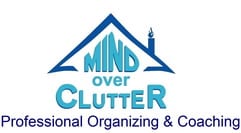
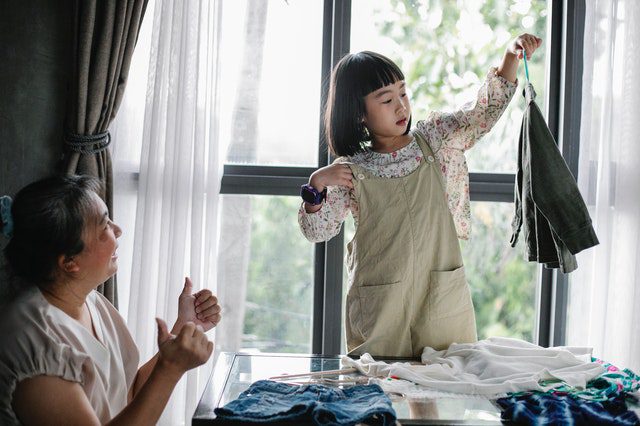
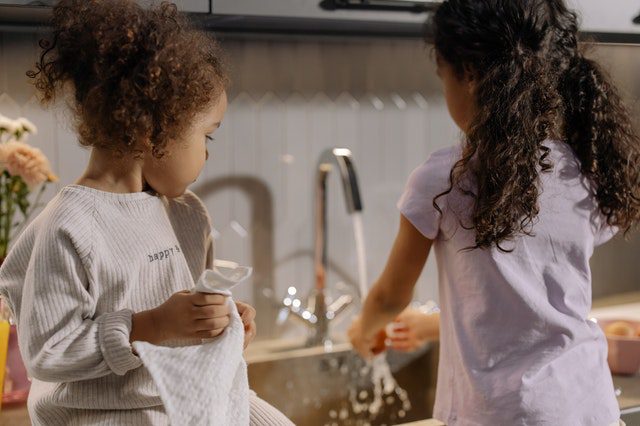
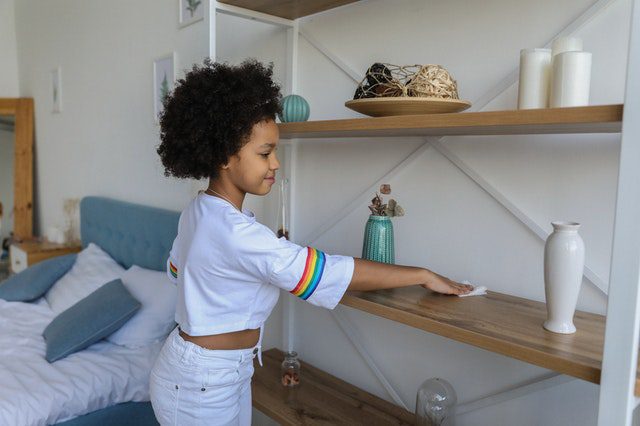
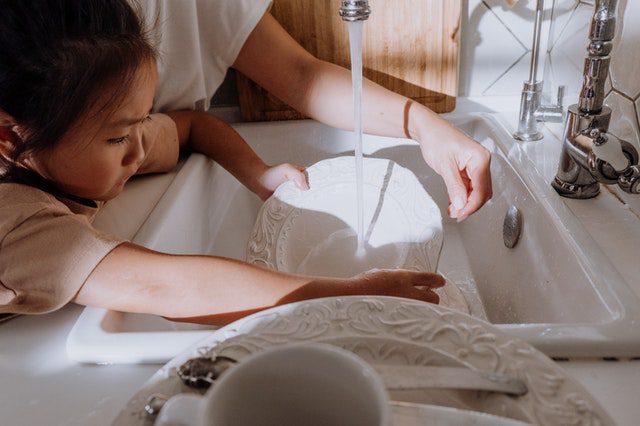

Nice ideas for encouraging kids to be willing and able to help out. Organizing their rooms goes a long way toward making it easier for them, too!
Sometimes when you’re teaching them organizing skills you think I could do this in half the time. It is worth the effort to teach them how to do it in the long run. There is less for the parent to do and you’re teaching responsibility to your children. A win-win. Thanks for your comment
I believe it is very important for children to be involved beginning at a very young age in caring for their toys, books, and belongings. It teaches them life skills, responsibility, and how to let go of things when they are no longer loved or in good condition. I co-authored 2 children’s books with Jonda Beattie about this: Suzie’s Messy Room and Benji’s Messy Room. Also, our deck of cards: Organize Your Home 10 Minutes at a Time has several cards labeled Child Friendly to get children involved in the cleaning and tidying of the home. Great topic, Julie!
Thank you for sharing those resources. Some parents have difficulty determining what child can do at what age. I found that if you help them, they learn how to do it quickly. It is never too earlier to put a toy away, garbage in a garbage can and clothes in a hamper whether they are walking on their own or carried by a parent.
I love that you reminded people not to associate decluttering with negativity. This is an important reminder. Thanks for sharing.
Decluttering is a positive thing you’re right. You are able to let go of things and give to others who can use them. I recently suggested to a parent that when your child is young is a good time to teach that not everything you have stays with you forever. At this age it is easy to teach because they grow out of clothing and sports gear so it is easy to declutter. Their preferences in toys change and it is easy to give them away. The parent who has a hard time letting go of things wasn’t sure how she felt about that idea.
I agree that teaching children how to manage their belongings and keep their space clean is very worthwhile. Some children will resist from day one, while others will enjoy it. Most are in the middle. I know from watching children in daycare and preschool that they can learn to fold in and follow simple directions, even from a young age. That said, parents need to not overwhelm the children with too many toys. I saw a meme that said if you give a child a room full of toys, they will leave it in disarray. If you give them 4 possessions, they will cherish and care for them. Food for thought!
I agree that playrooms are to full for children to be able to keeep them tidy. I suggest to parents switch the toys so not everything is out at once. I find parents feel to tired and busy to think about moving toys in and out of a closet.
Teaching basic organizing and cleaning to kids is a valuable life skill. It translates to their self-confidence, school management, and independence.
Our kids grew up with two working parents. Time was at a premium. We included them in the ‘house’ work, including meal prep, etc. They wanted to help, and as a result, they learned how to cook, food shop, organize, and manage the basics. This helped them easily make the transition to independence and adulthood when they went off to college.
We never considered ‘chores’ a punishment. We didn’t even think of them in that we- it was more a matter of teaching and helping each other with life management skills. We enjoyed bonding with them in any way we could, be it playing games or doing mundane things.
Family time has many components. It can’t always be expensive holidays, games and sitting around chatting or playing. When family time includes taking care of the home and their lives it teaches responsibility and it doesn’t take much time to take of your possession on a daily basis. Families working together as a team teaches helping each other and caring for each other and not just taking care of your own stuff. Thanks for sharing your experience in your family with your children.
I could have sworn I commented on this a few years ago when you ran it, but I guess not?
Chores for cleaning and organizing are not only a great way to teach responsibility, but they are low-stakes. Lots of kids, who don’t learn life skills until later are already at the stages where they fear making mistakes or “failing” and organizing/cleaning chores provide the opportunity to have small, frequent wins.
Plus, I love the idea of approaching these chores as fun and/or normative, rather than with a grumpy demeanor. Important points!
I like how you said to start earily teaching these skills before they worry about doing things wrong. When they are young it is low stakes. The tasks are small, simple and don’t take much time. Whatever age the child is praise for helping is always important.